The Ontario Health Study Newsletter, November 2023
Nov 20, 2023 // OHS Newsletter
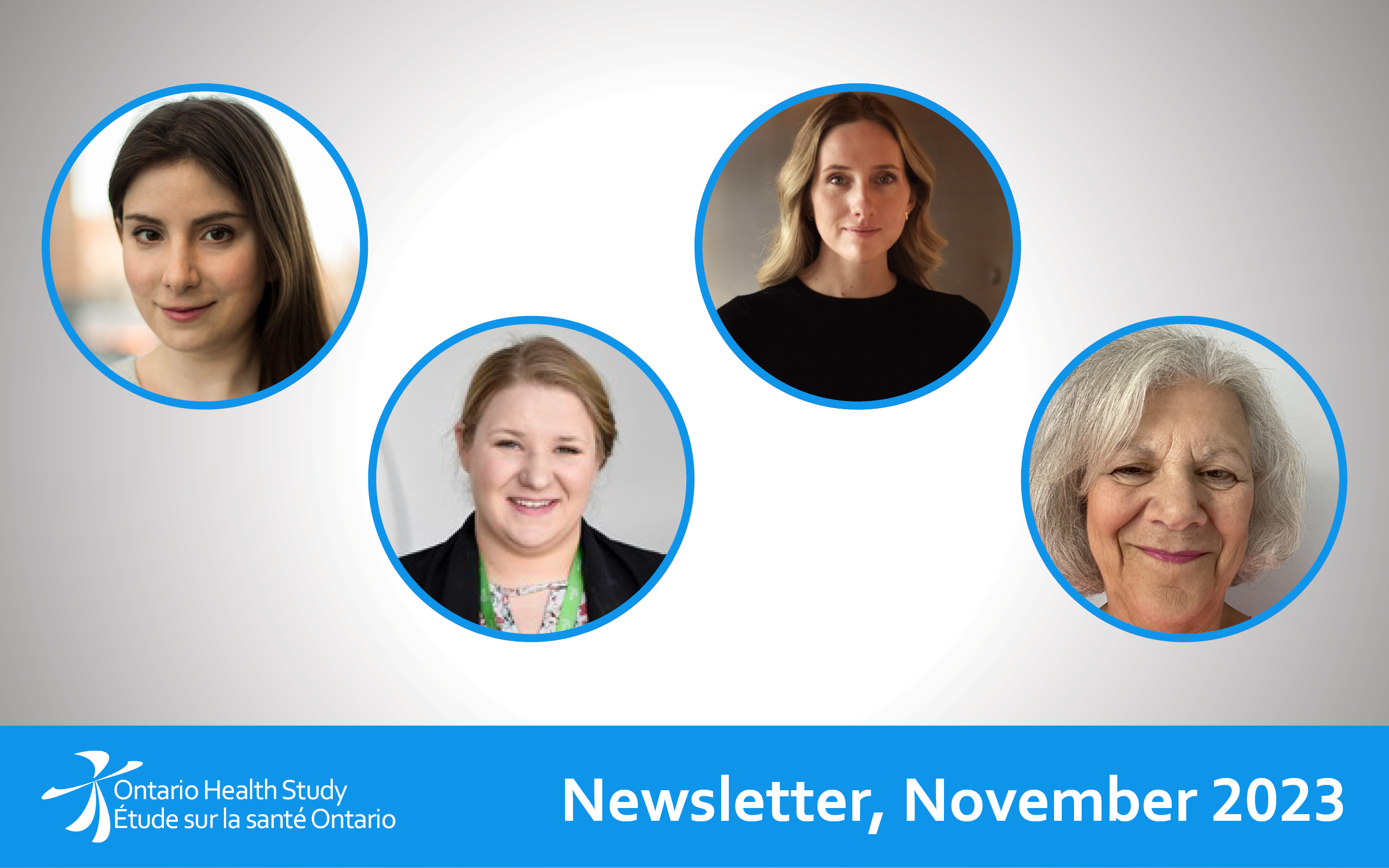
In this issue:
• New blood samples will expand research potential
• Enhancing Data Security with 2-Step Verification
• Engaging stories: what interests our participants?
• First peer-reviewed publication on Canada-wide COVID-19 immunity
• Stay in touch!
• Cancer diagnoses studied among OHS participants
• Why do you remain a member of the Ontario Health Study?
• What’s your cancer question?
• Do you have friends or family in Manitoba or Saskatchewan?
New blood samples will expand research potential
The math of aliquots – how the OHS will turn 3,000 into 90,000
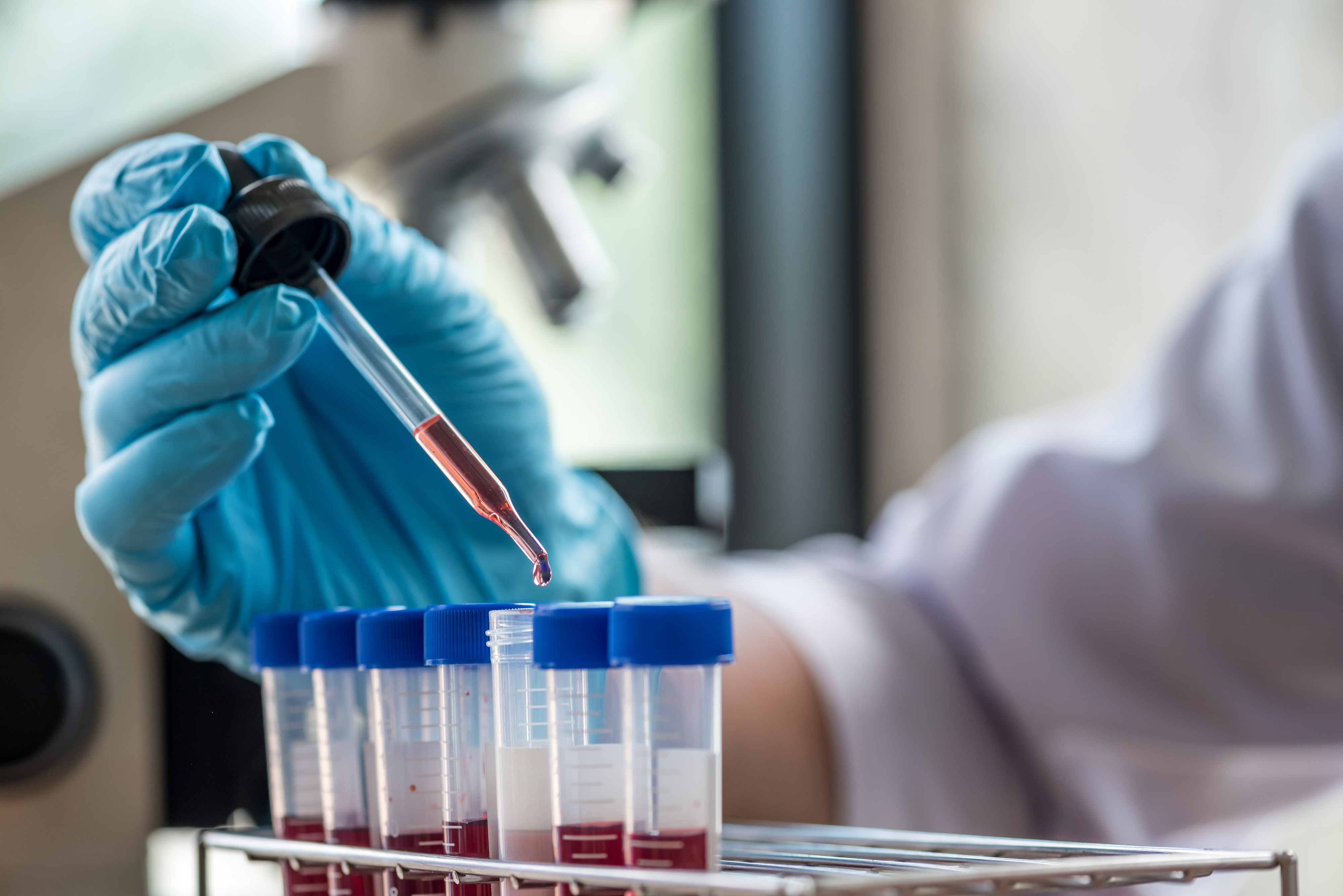
In 2024 the OHS will ask some participants to provide a second blood sample. We will be reaching out to some people who provided their first blood sample between 2009 and 2017. We hope that 3,000 of them will actually say yes, and go to a nearby blood clinic and provide a blood sample.
To tell you more, we asked our two OHS blood specialists.
Andrea Huston is the OHS Biospecimens Project Manager organizing the blood collection initiative. Lindsay Hayman is the Biospecimen Operations Project Lead, and she oversees how participants’ blood samples are collected, stored and distributed to approved researchers.
OHS: Why is the OHS collecting new blood samples?
 |
| Andrea Huston, Project Manager, OHS Biospecimens |
Andrea Huston: This is a long-term study where we want to follow participants for their lifetime. So having blood samples taken at two different times in their life is important to understanding how a person’s health progresses. These serial blood samples will allow researchers to explore various changes to elements within the blood over time. Studying these ‘biomarkers,’ especially in people who have not been diagnosed with a major disease, could help researchers develop better diagnostic screening tools.
These new blood samples could also allow researchers to look at the mechanisms of healthy aging, meaning researchers can study why some people in their 70s and 80s, for example, have a blood biomarker profile resembling that of a much younger person. It will be interesting to know what’s going on with these “healthy aging” individuals. There are of course many other types of research that these samples can be used for, such as early cancer detection.
Asking our volunteers to give up some of their own blood – it’s a big ask. But it will be a significant enrichment to the value of the data collected to date, and will grow the Study’s potential overall. I’m excited to be part of this effort.
OHS: How and where will participants be asked for a blood sample?
AH: Starting in 2024, we will email selected participants, inviting them to complete an online screening questionnaire and a digital consent form. After that, they will be directed to a blood collection lab near their home to provide the sample.
OHS: Why are only 3,000 more blood samples being collected?
AH: It may not sound like a lot, but consider that each of those 3,000 samples will be further processed into blood products such as serum, plasma, white blood cells and red blood cells. Then each of those will be further divided up into small tubes and kept frozen until requested by a researcher. Ultimately the 3,000 samples will turn into upwards of 90,000 sub-samples – a large amount of biological material available for many years to come.
OHS: Who are you looking for?
AH: To start, we will be inviting people 50 to 80 years old, who have no history of a major disease, and who have already provided a first blood sample to the OHS. Our plan is to keep inviting people until we collect 3,000 new samples.
OHS: How will these new blood samples get used?
 |
| Lindsay Hayman, Project Lead, OHS Biospecimens |
Lindsay Hayman: Within 24 hours of being collected, the tubes of blood will be shipped to our lab. There the blood samples will be aliquoted or divided up into 28 smaller tubes for storage. These samples will then be frozen temporarily to -80° Celsius and then stored in a liquid nitrogen freezer at -196° Celsius until they are requested by an approved researcher.
The samples will get used in a wide variety of approved research studies and could undergo different types of analysis in the coming years, including genotyping, DNA sequencing, proteomics, and metabolomics.
A second sample could help researchers to answer questions related to how environmental factors (where you’ve lived, sun exposure), lifestyle choices (smoking, alcohol use, activity levels), work experiences (exposure to chemicals or prolonged sitting) may impact health over time.
The great thing about the OHS is that every time a researcher uses our questionnaire data or biosamples, they must share back to us any new information that results from their OHS-supported work, or what’s called derived data. So, ultimately, each time a sample gets used, the Study is further enriched.
OHS: Will these blood samples be different from the blood spot cards some participants mailed in for the COVID-19 Antibody Study?
LH: Yes, very different. Unlike the five dots of blood on a special card that were provided by almost 10,000 participants for the COVID-19 Antibody Study, this time we will ask for a full blood sample. Just like when a doctor sends you for ‘blood work,’ you will be asked to provide several tubes of blood.
|
|
In 2021 we moved all the OHS samples to a new biorepository in the Greater Toronto area. Currently we have six large liquid nitrogen freezers holding an astonishing ~473,000 biospecimen vials containing blood, urine and DNA samples from over 41,000 OHS participants. 🧊❄🥶 Learn more about how your samples are stored: read this article from the November 2018 Newsletter.
|
|
Enhancing Data Security with 2-Step Verification
An extra layer of protection is now in place

In our last newsletter we asked you about your experience with various additional forms of account security. Now, we are excited to announce a significant enhancement, aimed at bolstering the security of your OHS account. As part of our ongoing commitment to safeguarding your data and ensuring the integrity of our research, we have implemented 2-Step Verification for all participant accounts.
Why 2-Step Verification Matters:
 |
Protecting Your Data: Data security is a top priority for our study. With 2-Step Verification, we add an extra layer of protection to your account, making it significantly more difficult for unauthorized individuals to access your account. |
 |
Preventing Unauthorized Access: 2-Step Verification requires two separate authentication factors – typically something you know (your password) and something you have (a one-time code sent to your email). This means that even if someone obtains your OHS password, they would also need access to your email account to complete the verification process. |
 |
Compliance with Best Practices: Implementing 2-Step Verification aligns with best practices in data security and is recommended by experts in the field. |
How It Works:
Completing 2-Step Verification is simple. The next time you log into your account with your username and password, you will receive a one-time code, sent to the email address associated with your OHS account. You will need to enter this code to complete the login process. You will not need to do this every time, only when we need to verify your identity. Here’s what the email will look like:
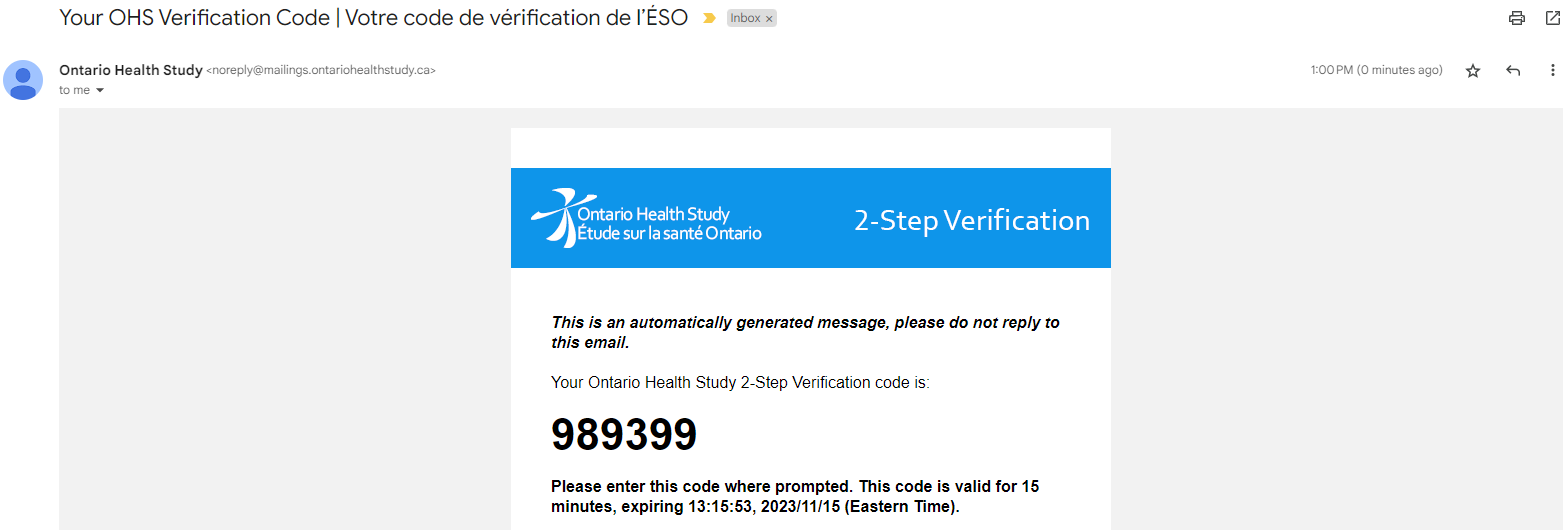
What You Need to Do:
- Ensure Your Contact Information is Up to Date: It's important to keep your registered email current so that you can receive the one-time codes for verification.
- Follow the Prompts: When prompted to complete 2-Step Verification, simply follow the on-screen instructions to retrieve and enter the 6-digit code.
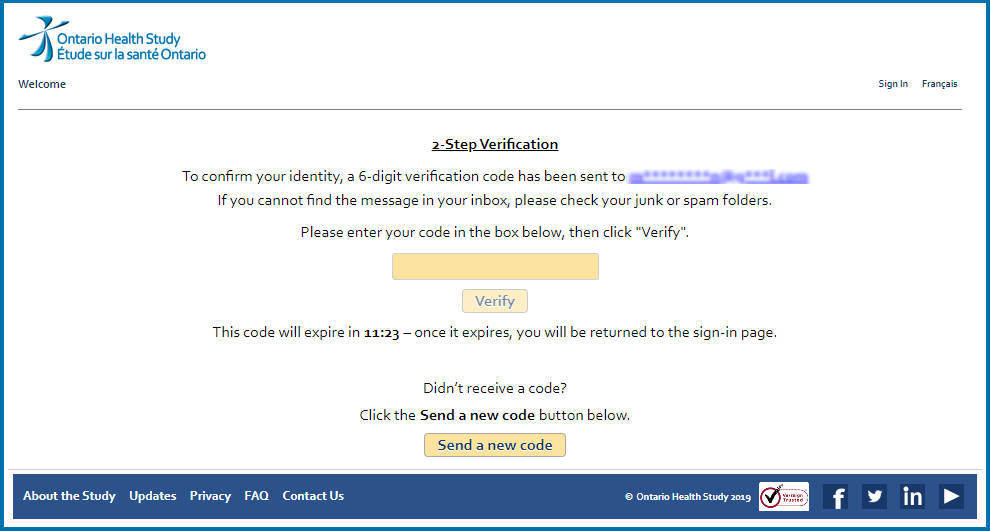
If you need assistance at any point, please reach out as we are happy to help. Thank you for your continued participation and for helping us make this study as secure as possible.
Engaging stories: what interests our participants?
Find out the results of the June 2023 issue’s readers poll
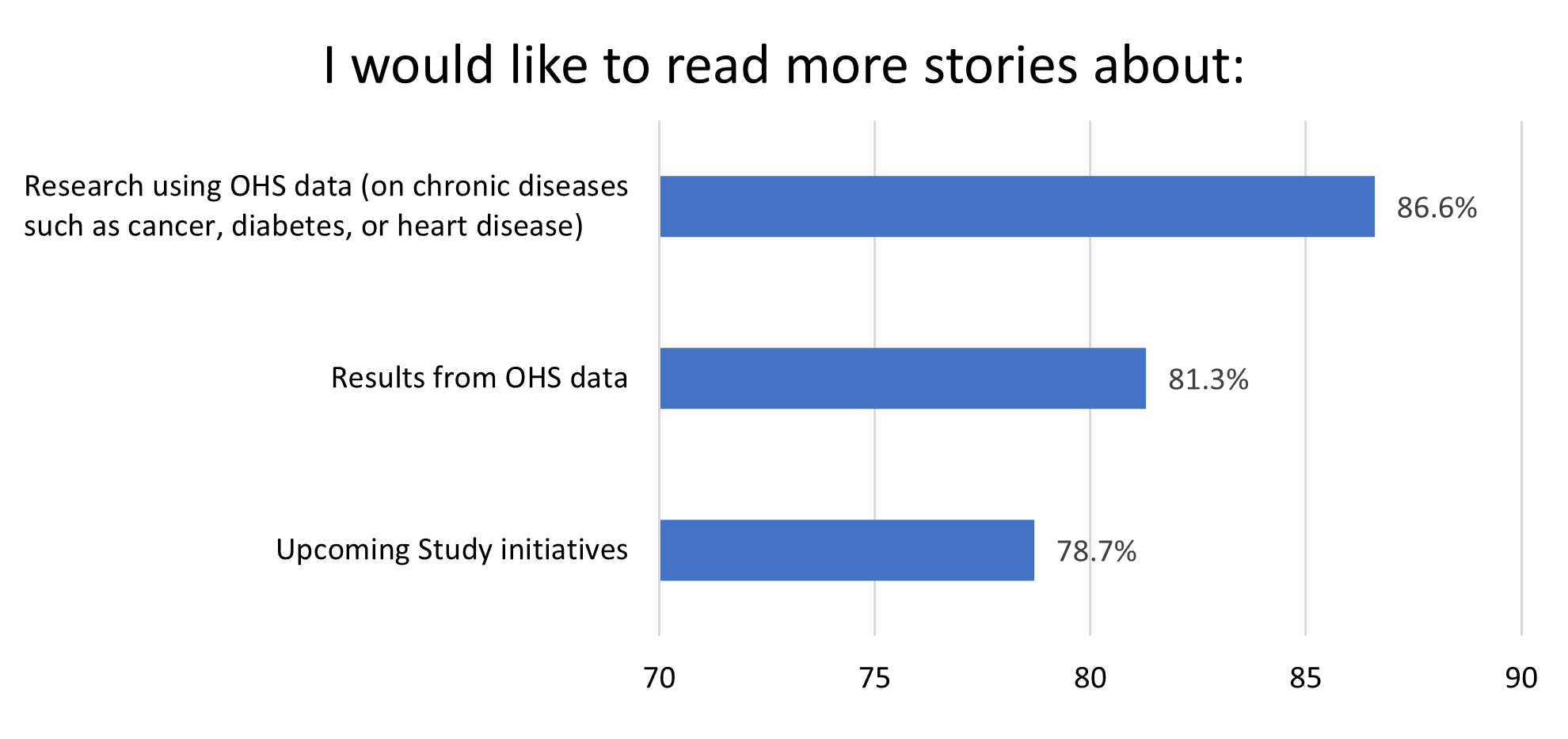
In our last newsletter, we asked readers about their preferences regarding the types of stories they would like to see more of. We were thrilled that more than 260 of you took the time to share your insights. Your feedback will guide us in crafting content that truly resonates with your interests and needs. Here's a recap:
Topping the list of story preferences at 87% of respondents was a keen interest in reading about research that leverages data from the Ontario Health Study, followed by results of research projects that use the data and samples provided by OHS participants, at 81%.
|
|
|
|
Another significant proportion of participants wanted to know what’s on the horizon, with nearly 79% of respondents want to learn about upcoming Study initiatives.
|
|
|
|
Thank you to all who participated in the poll - your input is invaluable, and it empowers us to craft and curate content that better aligns with your interests.
First peer-reviewed publication on Canada-wide COVID-19 immunity
OHS and CanPath participants contribute to important national research project
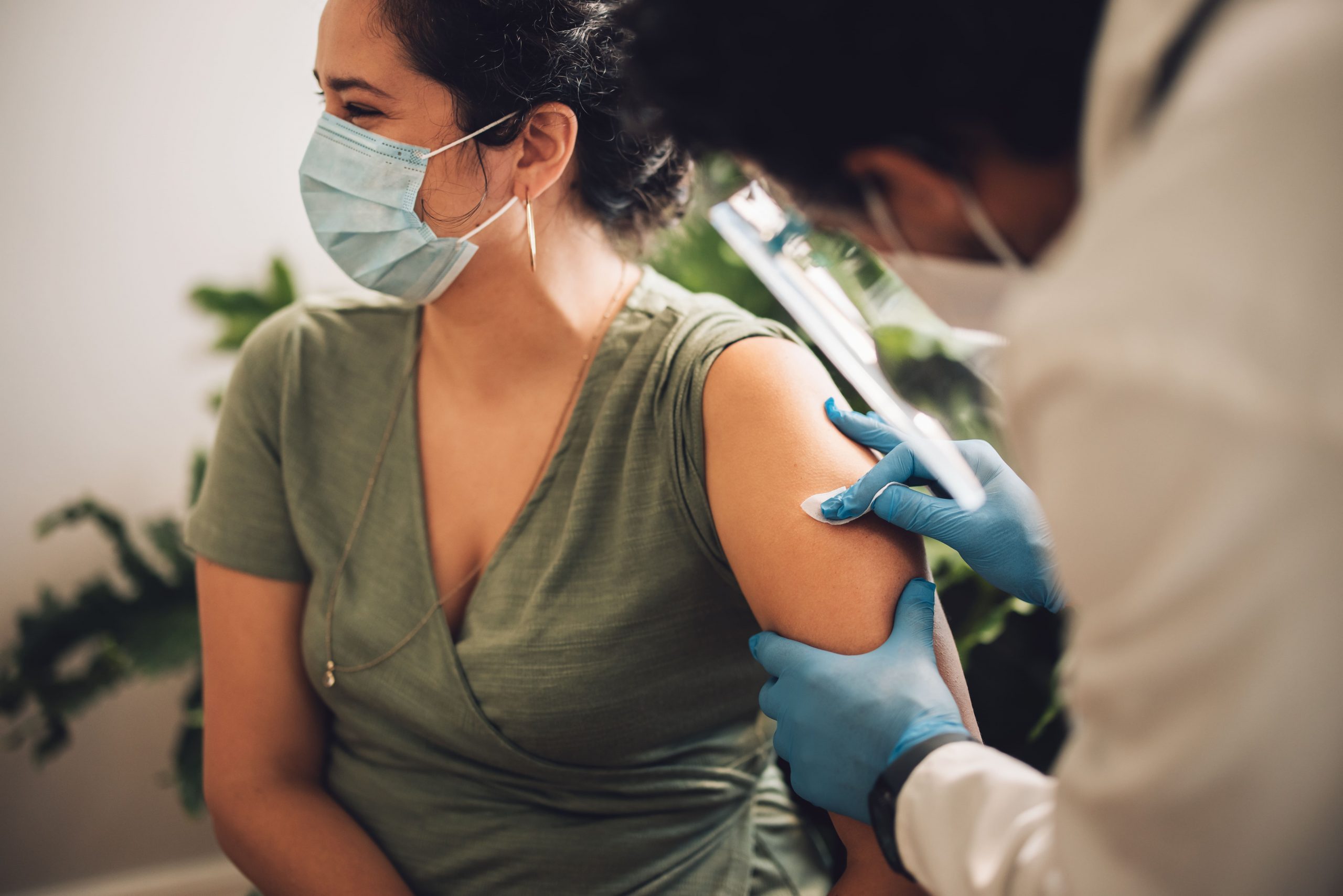
Earlier this year the Canadian Partnership for Tomorrow’s Health (CanPath), of which the OHS is the largest of seven participating cohorts, contributed to the first peer-reviewed publication showing how many people across Canada developed antibodies in response to COVID-19 infection or vaccination. These results were published in the Canadian Medical Association Journal (CMAJ).
Studies like this give us an idea of how widespread infection might be in the Canadian population, and found that by March 2023, more than 75% of Canadians had developed antibodies from COVID-19 infections.
Read more about this project and its results:
- Canadian Medical Association Journal: The evolution of SARS-CoV-2 seroprevalence in Canada: a time-series study, 2020–2023
- Globe and Mail: Data on COVID-19 in Canadians’ blood show impact of vaccination campaigns, new study finds
- U of T News: U of T researchers contribute to Canada-wide COVID-19 immunity study
- Ontario Health Study/CanPath: Boosting Immunity Insights: Collaborative Canadian Effort Contributes to Nationwide COVID-19 Immunity Study
Stay in touch!

If you have moved, changed your email or have a new phone number, please update your account so we are able to keep in contact.
Not able to log in? Please give us a call or email us to let us know.
New: For added security, we now send you an automated email confirming when your account information has been changed, such as your password, contact information, or your emergency contact.
Cancer diagnoses studied among OHS participants
No association found between depression and anxiety and many common cancers

Living with depression and anxiety has been thought to put people at a higher risk for certain cancers. New research from a large international study, which includes data from thousands of OHS participants, is showing otherwise.
In a paper published in August 2023, the PSY-CA (PSYchosocial factors and CAncer incidence) project failed to demonstrate an association between depression and anxiety and breast, prostate, colorectal, and alcohol-related cancers, or cancers overall. However, it did find an association of depression and anxiety (both symptoms and diagnoses) with the incidence of lung cancer and smoking-related cancers. The paper noted that those associations were substantially reduced when adjusted for the presence of other known risk factors for lung cancers, such as smoking, alcohol use, and body mass index.
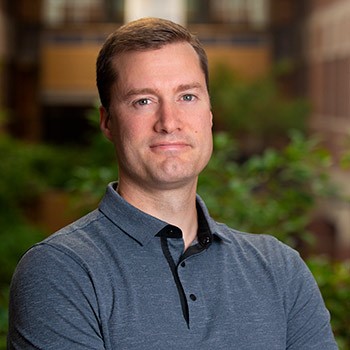 |
| Dr. David Soave |
The PSY-CA Consortium is examining data from 18 study populations in the Netherlands, United Kingdom, Norway and Canada. Using information from cancer registries, this meta-analysis (a statistical analysis of multiple studies) looked at data collected from more than 300,000 adults to explore the relationship between specific psychosocial factors and a cancer diagnosis.
Dr. David Soave of Wilfrid Laurier University led the OHS-related analysis for the PSY-CA project. He looked at data from 14,384 OHS participants. Other researchers looked at data from participants in two sister cohorts of the OHS, Atlantic PATH and CARTaGENE in Quebec.
He indicated the Ontario Health Study cohort of participants was well suited for the international project, as there was a substantial amount of information available on psychosocial factors that could be linked to known cancer diagnoses in the OHS study population. The psychosocial factors explored in the study were:
- Diagnosed depression
- Diagnosed anxiety disorder and anxiety symptoms
- Recent loss of a close family member or partner
- Perceived low social support
- Relationship status
- General distress
- Neuroticism
What should people take away from the study?
“Our results may be informative to many patients with cancer who believe their diagnosis is attributed to previous anxiety or depression.” said Dr. Soave.
He noted further research is still needed to understand how depression, anxiety, health behaviours and lung cancer are related. Read the full paper in Cancer, a peer-reviewed journal of the American Cancer Society.
Why do you remain a member of the Ontario Health Study?
Here’s what Gwen from Toronto had to say:
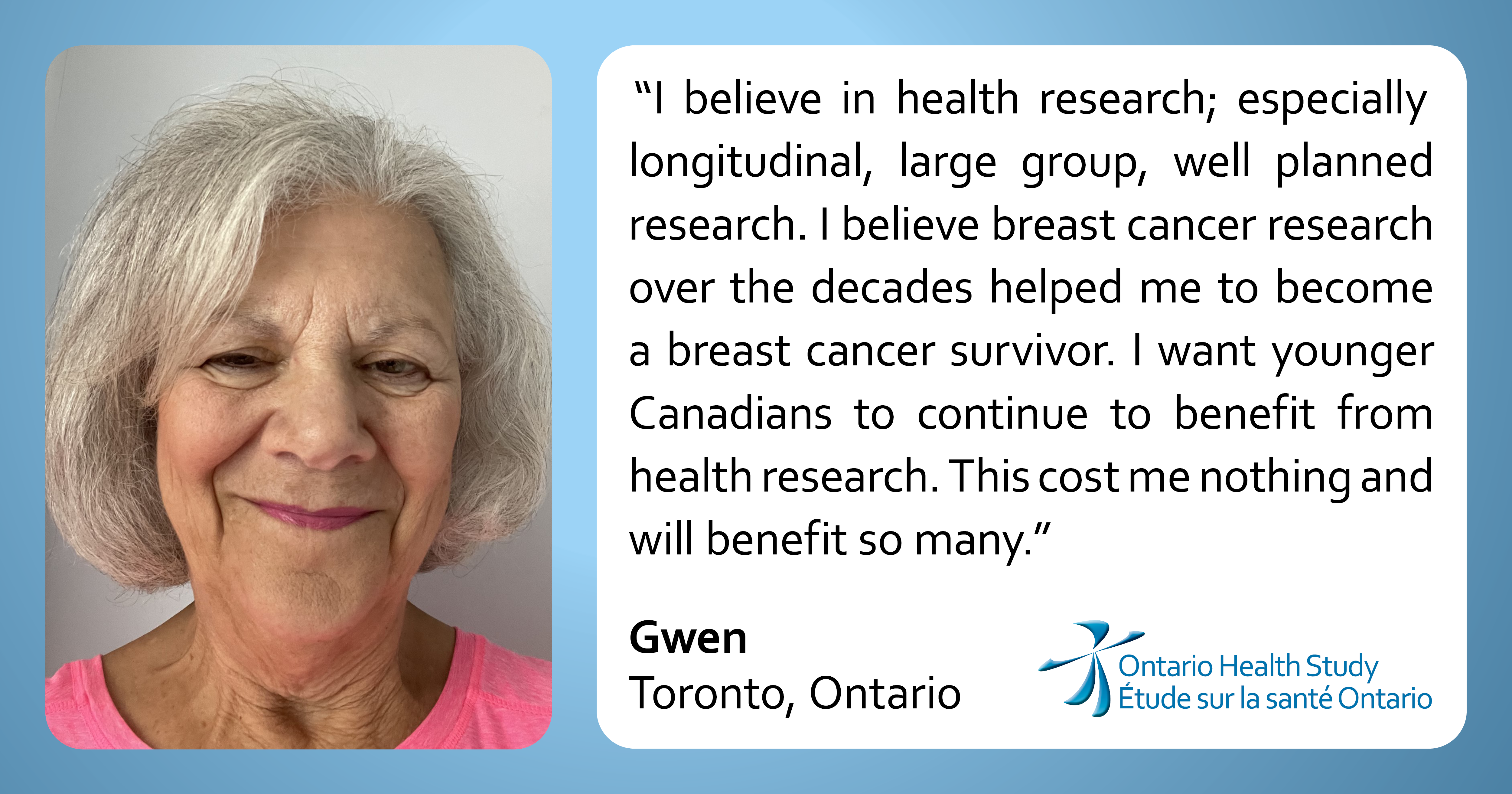
We love hearing from you. Why do you remain a member of the Ontario Health Study? Email us at info@ontariohealthstudy.ca
What’s your cancer question?
OHS data used to study ways to predict cancers earlier
Do you have question for a cancer researcher?
Longtime OHS participant Matt asked the question “how does our blood change as we age?” in a new video series called “Ask a Cancer Researcher.”
Watch Dr. Kimberly Skead answer Matt’s question by describing how population health studies like the Ontario Health Study can be used to study ways to predict cancers years before they can grow into tumours. Data from more than 7,000 OHS participants were used in Dr. Skead’s 2021-2023 research work.
The “Ask a Cancer Researcher” video series is hosted by the Ontario Institute for Cancer Research (OICR) in Toronto (where the OHS is located). OICR biologists, oncologists, immunologists, and other experts answer questions about cancer submitted by folks across Ontario.
Most “Ask a Cancer Researcher” videos are not related to the work of the Ontario Health Study, but you can submit your cancer question here: https://forms.gle/dYVhyKDa26YbmpoXA. If your question is selected, OICR (not the OHS) will email you with next steps. Please note that their cancer experts cannot offer medical advice or comment on personal medical experiences.
Do you have friends or family in Manitoba or Saskatchewan?
These studies seek participants for long-term health research
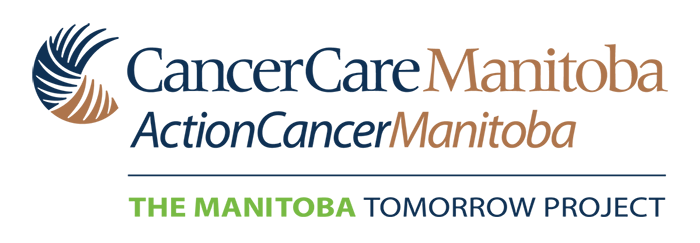 |
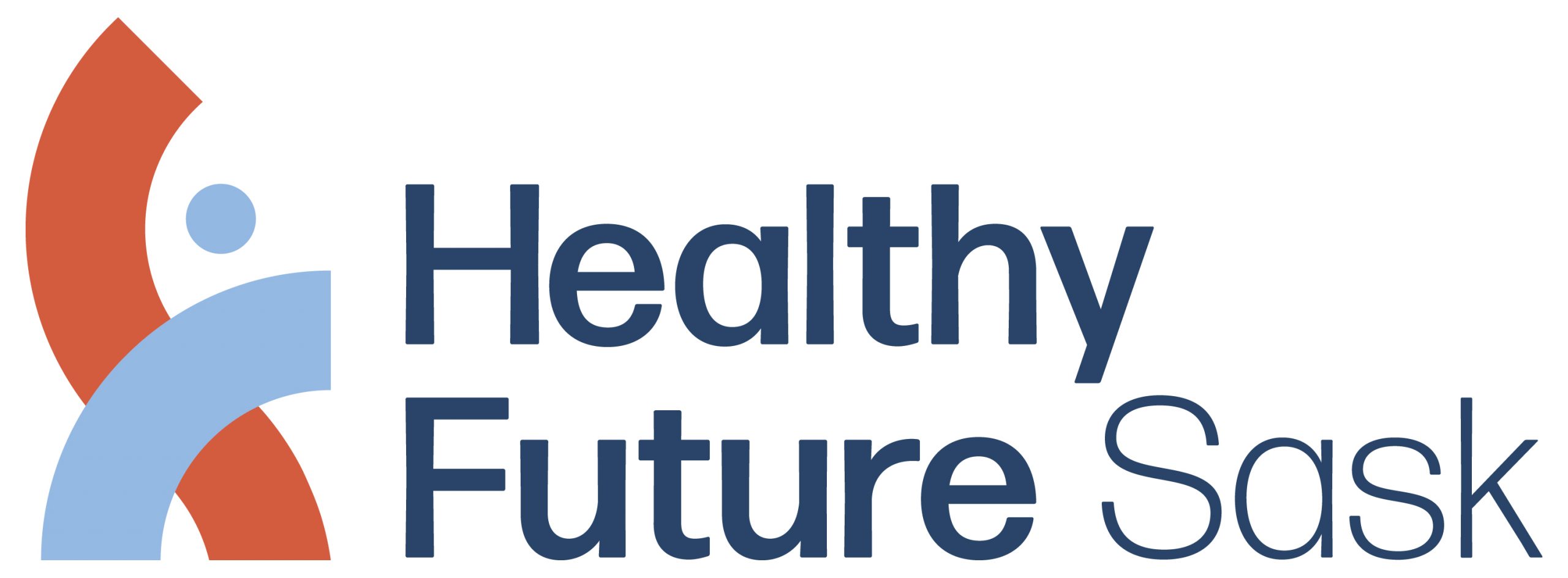 |
Tell your friends in Manitoba and Saskatchewan they can join a long-term health study very similar to the Ontario Health Study. The Manitoba Tomorrow Project and Healthy Future Sask are recruiting participants between the ages of 30-74, and their goal is to learn more about the causes of cancer and other chronic diseases. Please share the registration links below with friends and family living in those provinces.
Manitoba Tomorrow Project: www.manitobatomorrowproject.ca
Healthy Future Sask: https://healthyfuturesask.ca/Participant/Portal
